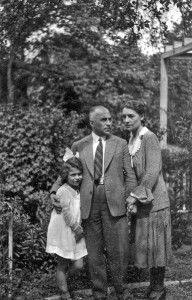Forced labor for Ernst Hess, whipping for his daughter
 JVG: How did your father obtain the special permit?
JVG: How did your father obtain the special permit?
Fritz Wiedemann, adjutant with the List Regiment, was the reason my father was granted certain privileges. They had been comrades during World War I and Wiedemann really was committed to helping him. But it seems he wasn’t that fanatic a Nazi, so he was sent to San Francisco later. (…) When they ran across each other by chance on the streets in Munich (in the early 1930s, author’s note), he told my father that he’d met Hitler, who had said, “Oh, but once I’m in Berlin, you come and work for me.” And that was how Wiedemann became Hitler’s adjutant. (…) Based on Wiedemann’s infl uence, who had put him in touch with Lammers also, my father was granted those privileges.
But when the special permit was revoked in 1941, he was forced into labor in Munich.
Yes, he had to work for a timber- processing fi rm. Regardless of the weather, he had to work outdoors at a machine. They were building barracks for Wehrmacht soldiers on the Wallberg Mountain.
Obviously, the slave workers were forced to live outdoors and were treated terribly, and of course they were watched by members of the SS. My father cut his arm very deeply, and after that, his hands were done for. He could no longer play the violin – which had been his life, after all. He had given concerts with Anton Schoenmaker in Wuppertal. (…)
My father was a great sportsman. Had he not been as fit as he was, he would never have survived this ordeal.
What was your experience of the Third Reich, as a child and teenager?
When I entered grade school in 1932 in Wuppertal, my teacher would call me to the front of the class every morning and he would give me a whipping with a small cane. I never told my parents. I thought to myself, “You’ll probably have done something wrong, otherwise he wouldn’t be doing that.” Later, the mother of another child told my parents, and I was transferred to the other fi rst grade class. At the time, that was still possible. But the teacher wasn’t fi red, not in the least. Antisemitism had existed for all time, after all. (…) My mother always felt badly that I was an outsider. I was never really a part of things.
But you’ve also had other, positive experiences.
There were people whose actions were quite touching. For example, there was a couple; he was an architect. They had stored our silverware in their basement. When the war was over, they returned it.
Other people told us, no, they had never had anything of ours. Those are very special experiences, and this is where people show their real character.
